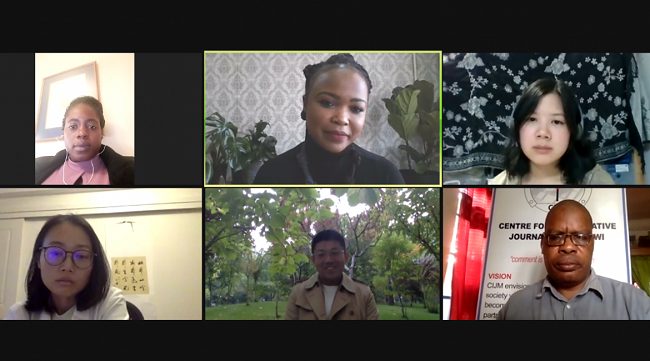The global effects of the Covid-19 pandemic continue to impact journalism around the world. Faced with the challenges of reporting on the environment during and post-Covid-19, investigative journalists from Africa and China shared issues that have created peculiar trajectories in wildlife reporting, trans-border collaboration, data sourcing and tools, and internet connectivity.

The session of the African Investigative Journalism Conference 2020 (AIJC2020) on Thursday, October 15 , titled: “The State of Africa-China Environmental Journalism during and post-COVID-19” – facilitated by Bongiwe Tutu, a project coordinator at Wits University, in Johannesburg – was a frank discussion on the consumption of wild animals, which are believed to have led to the outbreak of Covid-19.
Speaking during the session, Shi Yi, a researcher at China Dialogue, spoke on wildlife protection and trafficking in China after Covid-19.
She said, “China has one of the toughest laws, enforcement and penalties to curtail biodiversity and environment.”
Yi has travelled to many countries in Africa and Asia to investigate the state of environmental exploitation and wildlife crimes. She affirmed that researchers were calling for the end of the consumption of wildlife.
Yi also said that in February 2020, the Chinese authorities banned wildlife consumption. She added that she was also concerned about those countries with weaker laws, where Chinese interests could exploit biodiversity. However, the demand for wildlife products and animals for traditional medicine could be rife post-Covid-19 because it’s not a regulated area in China, and concerned, it could in a way, boost illegal wildlife trade, said Yi.
Collins Mtika, a senior investigative journalist at the Centre for Investigative Journalism Malawi, highlighted some of the immediate challenges of environmental journalism in African newsrooms, in times of Covid-19, adding that media organisations have been playing an important role in covering environmental issues.
Mtika said he was concerned that Covid-19 had an impact in reporting on the environment and that many journalists changed their focus to health reporting due to the pandemic. He admitted that internet connectivity had been another hiccup for journalists who work from home due to travel restrictions and that high data costs for investigative journalists, especially those working as freelancers; adversely affected their investigations.
Also speaking at the session, Liam Lee, the chief international desk correspondent at Ta Kung Pao Daily, talked extensively on how the One Belt, One Road initiative would affect the future of Africa-China development reporting, and how journalists were digging stories during the Covid-19 pandemic.
Lee tabled the reasons why industry emissions are still going on, and the environmental impact this has in China. He further accused companies that are awarded contracts in the One Belt, One Road project of not strictly adhering to environmental laws, stating that this could pose a great concern to Africa because of pollution transfer.
The Ta Kung Pao Daily correspondent said that “this pandemic affects the One Belt, One Road initiative.” And that Africa will be the next priority for China. Since the industry emissions are ignored, the trend is manipulated by corruption and state influence.
Crystal Chow, an award-winning freelance journalist based in Hong Kong, spoke on the outlook for environmental journalism post-Covid-19. She said food supply chains and food security have been proportionally affected by Covid-19 and that the response of communities was critical to creating sustainable (green) solutions.
Another revelation by Chow was the increase in land grabbing, deforestation, and attacks on farmers due to the restrictions put on access to resources. She explained the differences between a wildlife market and a wet market, saying that the terms were often, incorrectly and interchangeably used by many members of Western media.
Also speaking at the session, Nesia Mhaka, a reporter for The Herald in Zimbabwe, disclosed how investigative journalists were harassed by the police and sometimes the military, as a way to keep the lid on environment issues from the public.
Mhaka revealed that it was difficult for freelance journalists to have access to official reports and data, adding that, in many ways, this affects environmental reporting in Zimbabwe.
She further disclosed that, because she works for a state-owned media, gaining access to official information was easier but she could not expose cases of corruption by the government.
By Francis Annagu (Freelance journalist, based in Kaduna, Nigeria; AIJC2020 Fellow)
